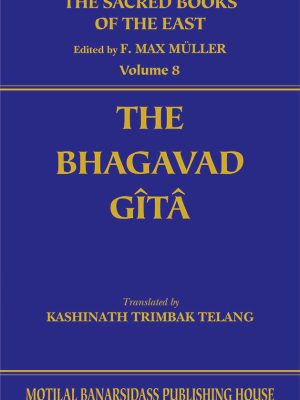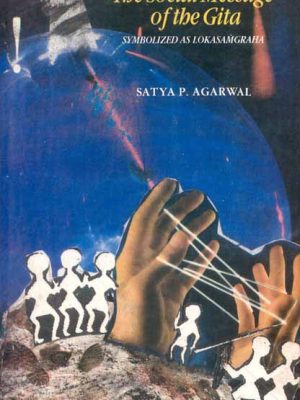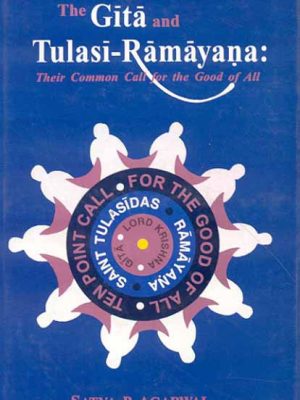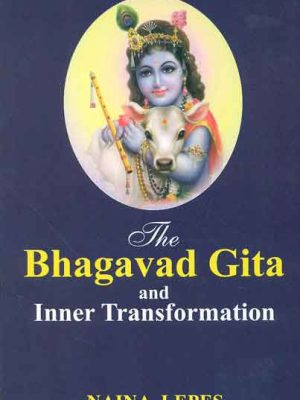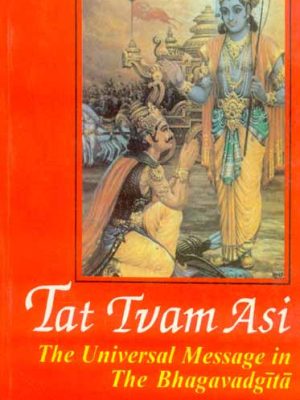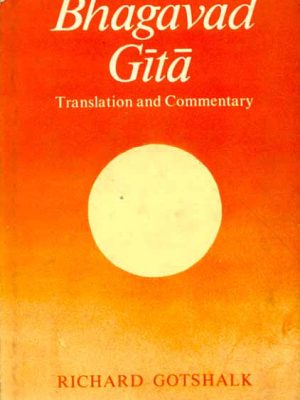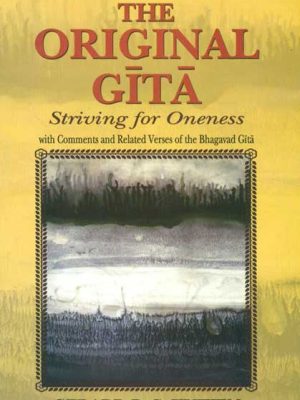Bhagavad Gita
-
The Bhagavadgita (SBE Vol. 8)
Review(s)
About the Author(s)
₹750.00The Bhagavadgita (SBE Vol. 8)
₹750.00 -
The Social Message of the Gita Symbolized as Lokasamgraha: (Self Composed Skt. Slokas with Eng. Comm.)
This book is a landmark in the wide panorama of Gita Literature, the universal nature of which is reflected in the use- in the form of prose as well as poetry-of an increasing number of the world’s languages. As the first book to utilize original verses in modern Sanskrit to convey the social massage of the Gita, it not only fills a significant linguistic gap but also focuses attention on social issues which call for urgent action by karmayogins.
Review(s)
About the Author(s)
Dr. Satya P. Agarwal is a Social Scientist. His academic honours include five gold medals and numerous merit scholarships and research fellowships at various universities. The Governor of the State of Maryland conferred upon him “The Governor’s Citation”, in recognition of his pioneering books as also his contribution to social service. He is author of several books besides the present one which are widely acclaimed and appreciated by the discerning readers. Other honours conferred on him include: (i) Kunti Goyal International Award, (ii) Special Award of Manas Sangam and (iii) International Tulasi Award.
₹395.00 -
The Gita and Tulasi-Ramayana: Their Common Call for the Good of All
This book has identified “the good of all” as the single most important criterion of excellence of any socio-spiritual approach to life’s problems–particularly in the context of the conflict-ridden society of today. The comprehensive coverage of this criterion, as presented in this study, has strong links with (like Ganga, Yamuna, and Saraswati) three life-sustaining streams of thought. The first stream refers to the lokasamgraha-message of the Gita which has been formulated in that scripture from ten different but inter-connected angles. The second stream refers to the jagmangal-message of the Manas which is simpler to grasp and which can also be explained from the same ten angles as applied to the Gita. The third stream refers to the repeated expressions of the concern for “the good of all” which began with the Vedas and which continued as an integral part of the Indian tradition–a steady source that strengthened the calls of the Gita and Manas also.
By putting all these ideas together and by maintaining the interest of the readers, this book has opened the door to a new field of study and research, viz. the Indian contribution to the theory and practice of “the good of all.”
Review(s)
“His arguments are forceful and convincing. The book is a gem which is worth acquiring by all those interested in the subject.”
NATIONAL HERALD
About the Author(s)
Dr. Satya P. Agarwal is a Social Scientist. His academic honors include five gold medals and numerous merit scholarships and research fellowships at various universities. The Governor of the State of Maryland conferred upon him “The Governor’s Citation”, in recognition of his pioneering books as also his contribution to social service. He is the author of several books besides the present one which are widely acclaimed and appreciated by discerning readers. Other honors conferred on him include (i) the Kunti Goyal International Award, (ii) the Special Award of Manas Sangam, and (iii) the International Tulasi Award.
₹395.00 -
The Bhagavad Gita and Inner Transformation
This contemporary companion to the Bhagavad Gita addresses the heart of human yearning. It offers the possibility of transforming the battle of life into a path to Truth, a living process. Each chapter presents a road toward our inner, universal Self, bringing a deeper and wider perspective along the way.
A psychological orientation invites the reader to move from abstract idea to individual insight. As the book proceeds, the relationship between the personal and the eternal gradually unfolds in an ever-expanding process of self-discovery.
Quotes from the great teachers are included in the text to inspire, uplift and help us cross over the sea of illusion.
When we can link our heart to that which has been called the first cause, the causeless cause, the way it will carry the momentum of our life toward ultimate fulfillment. This is Krishna’s promise to the person who surrenders his ego to the will of the higher force, be He called Krishna, Christ, Buddha, Yaweh, Self or the Divine Mother.
To live one’s life on the foundation of this secret brings true self-confidence.
For those who worship me alone,
thinking of no “other”
I provide for all they need.
Bhagavad Gita 9:22
Review(s)
About the Author(s)
Naina Lepes is the author of From Maya to Oneness and The Cat Guru. Her teachers are Sai Baba, Swami Chinmayananda and Mother Nature, whereas her formal education includes degrees in music, psychology and counseling.
Formerly, Naina worked as a Jungian-trained psychotherapist in New York, and now lives in the Kumaon region of the Himalayas.
Visit the author’s websites at www.thegitaspace.com and www.catguru.com.
₹695.00 -
Tat Tvam Asi (2 Vols.): The Universal Message in The Bhagavadgita
The Bhagavad Gita, a great poem attributed to Rsi Vedavyasa, expounds Vedanta philosophy in the dynamic setting of a battlefield where Lord Krsna reveals the teaching of Vedanta to the warrior prince Arjuna. The essence of the Gita is to make one realise tat tvam asi. We are really the atman or Divinity with an outer covering of the physical body inside which is subtle body consisting of the mind and the intellect. Unfortunately we get attached to the body and develop the ego which is the ‘I’ or ‘My’ -ness in us. It makes us believe that our physical body is real. We forget that we are living because of the life-force inside us. The life-force is the spiritual energy and is known commonly as ‘soul’ or Atman. Tat Tvam Asi is a ‘great Upanisadic sentence’ exhorting us to realise our own divine identity. To realise one’s own divine status, to realise the same divine status in all forms manifest in the universe is to realise the oneness of all beings.
Contents (Vol. 1)
Forword, Message from Swami Hari Har Ji, Note Acknowledgements from the Author, Introduction, Arjuna-Visada-Yoga, Samkhya-Yoga, Karma-Yoga, Jnana-Yoga, Karma-Samnyasa-yoga, Atmasamyama-Yoga, Jnana-Vijnana-Yoga, Rajavidya-Rajaguhya-Yoga, Vibhuti-Yoga.
(Vol. 2)
Visvarupa-Darsana-Yoga, Bhakti-Yoga, Ksetra-Ksetrajna-Yoga, Gunatraya-Vibhaga-Yoga, Purusottama-Prapti-Yoga, Daivasura-Sampad-Vibhaga-Yoga, Sraddhatraya-Vibhaga-Yoga, Moksa-Samnyasa-Yoga.
Review(s)
About the Author(s)
₹1,500.00 -
Bhagavad Gita (Richard Gotshalk): Translation and Commentary
The Bhagavad Gita is a dramatic poem which forms a small part of the great epic, the Mahabharata. The poem is the dialogue through which Arjuna’s doubts are resolved by Krsna’s teaching about the nature and place of action in the ultimate reality of things. The present translation is supplemented by a commentary; both seek to emphasize how the teaching is rooted in the concrete situation, and how its order and structure reflect the changing condition of the conversants and the purpose of the conversation. Footnotes and notes are included to clarify the Sanskrit, to indicate alternative translations, and to note relevant comments from other commentators and translators.
Review(s)
About the Author(s)
₹500.00 -
The Original Gita: Striving for Oneness with Comments and Related Verses of the Bhagavad Gita
We live in a world that functions by seeming ‘dualism’, a perspective that keeps us in bondage. In this book, dualism is addressed and shown to be illusionary, since every pair of opposites implies a third element: the notion of a difference implied by both opposites.
The Original Gita, which predates the Bhagavad Gita, focuses on the basic philosophical and practical essentials of life and living. Here dualism is addressed and shown to be illusionary, since every pair of opposites implies a third element: the notion of a different implied by both opposites. The discussion of what is an ever-present ‘difference’ in such a triunity and how it impacts everything we perceive is pivotal to awakening to a new dimension of observation. It is in the unseen difference that we become aware of opposites, such as long-short, day-night, true-false.
In the first part of the book, the questions-What is thought? What is space-time? What is life-death? – are examined in concise form to give a foundation for the understanding of the philosophy of the Gita. Using this basis of Eastern wisdom, the author comments on the 209 verses of The Original Gita, and a Sanskrit-to-English translation is given of the related 319 verses in the classic Bhagavad Gita that correspond to these verses; these 319 verses can therefore be considered as the core of the Bhagavad Gita. There is no reference in The Original Gita to the battle fought by the Bharatas, nor is there support for the caste system, which were interpolations added later to the Bhagavad Gita. The book includes a glossary for clarification of a number of germane Sanskrit terms, a bibliography, and an index.
Review(s)
About the Author(s)
Dr. Gerard D. C. Kuiken received his Ph.D. from the Delft University of Technology, where he lectured in the fields of fluid mechanics and thermodynamics. He is the author of Thermodynamics of Irreversible Processes: Applications to Diffusion and Rheology, published by John Wiley & Sons. He has studied yoga since his youth, and resides in both The Hague in The Netherlands, and Santa barbara in California, USA.
₹600.00 -
The Legacy of Yoga in Bhagawad Geeta: The Classical Text of Srimad Bhagawad Geeta in Skt, its Romanized transliteration, Eng Translation, Lucid Commentary and Indexes
The Geeta is an intimate dialogue between God and man. The God-incarnate is Lord Krishna and man is represented by the Mahabharata hero Arjuna. It is intimate because the esoteric wisdom imparted therein, says the Lords, is “is more secret than secrecy itself” (XVII. 63).
A great battle is to ensue between the two royal clans of Kauravas and Pandavas. Arjuna requests
Krishna, who is acting as his charioteer, to take him between the two standing armies so that he
may have a look at those who have gathered to fight with him. There Arjuna is overcome with grief and refuses to raise his bow against his respected gurus and elders, and other kith and kin. At this critical juncture Lord Krishna explains to him what is right and what is wrong, and how by adhering to dharma a person can earn the highest virtue.
Every human heart is like a battlefield of good and evil forces. At times a person is not able to
decide the right course of action. He is deluded and confused. When confronted with such a
situation, he can turn to the Geeta, it will not fail him. The book therefore is of universal appeal which offers satisfactory solution to basic human problems. Whatever page you turn, and whichever verse you read, it is bound to elevate and inspire. It is not the book of a particular race or religion but the common heritage of the entire mankind.
The general theme of the dialogue is the realization of the Supreme-Self through the constant practice of Yogic entity. Sri Krishna declares that those who strive, endowed with the spirit of selfless action, Yajna and Yoga, perceive the Lord dwelling in the self. Sri Krishna gives a
definite promise of His grace in the words, “Resigning all the Dharmas, seek refuge in Me
alone. I shall liberate you from all sins Grieve not.”
Review(s)
The explanations of verse are elaborate and elegant … . Laced with inspiring anecdotes, it is a remarkable commentary which will enlighten the learned as well as the laymen, in India and also in foreign lands. – BALDEO SAHAI Fellow, Indian National Science Academy
Mrs. Prabha Duneja has presented the universal and timeless message of The Bhagawad Geeta in a scholarly yet practical way. – Swami Prabuddhananda, Vedanta Society of Northern California, USA
The Legacy of Yoga in Bhagawad Geeta is a unique scholarly achievement and one, which will greatly benefit all who encounter it. I heartily recommend it. – Prof. Norris W. Palmer, Ph.D. Saint Mary’s College of California, USA
From the moment, I picked up Prabha Duneja’s translation of The Bhagawad Geeta, I knew this was an inspired work. Not only is her rendition an academic contribution in clear English but it retains the power of the original Sanskrit. – Prof. Sujan Burgeson Ph.D., Yuba College, California, USA
About the Author(s)
Founder and president of the Geeta Society, is also an active member of the Women’s Federation for world peace and the United Nations Association, USA. She is also the chairwoman of the Women’s Interfaith Circle of Service/CC-URI and a recipient of the Global Citizen award, given by UNA-the Commonwealth Club San Francisco, the Parliament of World’s Religions, schools, universities, churches, mosques, and interfaith conferences.
Mrs. Duneja, a graduate from the Sanskrit University of Kurukshetra, is a well-known Vedic scholar and a devotee of Lord Krishna. She is the author of the Legacy of Yoga in Bhagawad Geeta, Mantra and the Modern Man, Bhagawad Geeta: The Gospel of Timeless Wisdom, and has also recorded several series of lectures on the science of yoga and meditation, the secret powers of mantra, and the Bhagawad Geeta. For more information visit her website: holygeeta.org and contact her at duneja@aol.com
₹500.00
